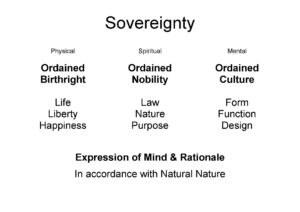
Express Your Interest
Please click this link, complete the form, and we will engage with you in due course.
Sovereignty and its Relationship to Natural Law Is…
A set of universal, inherent, objective, non-man-made, eternal and immutable conditions which govern the consequences of behaviors of beings, with the capacity for understanding the difference between harmful and non-harmful behavior.
The understanding of Natural Law is centered upon bringing our own Conscience into alignment with Objective Morality.
This means definitely KNOWING which behaviors are RIGHT because they do NOT cause harm to other sentient beings, and which behaviors are WRONG because they DO cause harm to other sentient beings.
The Paradigms and Spirit of Sovereignty
As stated in our Introduction to Sovereignty video: Sovereignty is a state of mind that must be considered in the Physical, the Spiritual, and the Mental. Therefore we have, Physical-Sovereignty, Spiritual-Sovereignty and Mental-Sovereignty. These three dimensions, can be encapsulated in one general context, as the Paradigms and Spirit of Sovereignty. In essence, this means that we possess an innate naturally occurring underlining consciousness of Sovereignty that runs through all of our natural-nature. This is an important concept to grasp and something to always be mindful of. The Spirit of Sovereignty, acts as a moral set of codes, acts justly in all contexts, and under the same set of circumstances and conditions, brings correctness and balance to every situation, the same way, each time.
The idea that Sovereignty is Equitable, is a reasonable consensus, that sounds right.

In order to properly put into context what Equitable Sovereignty for the individual is all about, let us first consider what we have modified and called the Equitable Maxims of Sovereignty, (you can read our ‘Equitable Maxims of Sovereignty’ blog post here). For those of us who may be unaware, a maxim is a concise expression of a fundamental moral rule or principle, that can be considered as objective or subjective, dependent upon one’s cultural narrative.
There are 20 Equitable Maxims, aka the Maxims of Equity to consider. We have listed them here, and also in our blog, but we suggest that you to take the time to research them, as you will find more detailed explanations and descriptions of them online. Our modified version is as follows:
01 Sovereignty sees that as done what ought to be done
02 Sovereignty will not suffer a wrong to be without a remedy
03 Sovereignty delights in equality/Equality is equity
04 One who seeks Sovereignty must be an embodiment of Sovereignty
05 Sovereignty aids the vigilant not the indolent
06 Sovereignty imputes an intent to fulfil an obligation
07 Sovereignty acts in personam and not in rem
08 Sovereignty abhors a forfeiture
09 Sovereignty does not require an idle gesture
10 He who comes into Sovereignty must come with clean hands
11 Sovereignty delights to do justice and not by halves
12 Sovereignty will take jurisdiction to avoid a multiplicity of suits
13 Sovereignty follows the law
14 Sovereignty will not assist a volunteer
15 Where Sovereignties are equal, the law will prevail
16 Between equal Sovereignties the first in order of time shall prevail
17 Sovereignty will not complete an imperfect gift
18 Sovereignty will not allow a statute to be used as a cloak for fraud
19 Sovereignty will not allow a trust to fail for want of a trustee
20 Sovereignty regards the beneficiary as the true owner of property.
